 Petzlover
Petzlover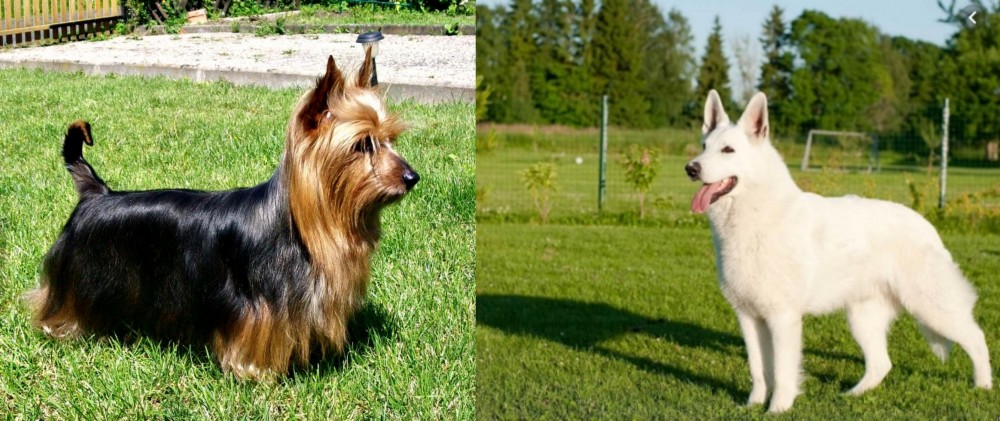 Australian Silky Terrier is originated from Australia but White Shepherd is originated from United States. Australian Silky Terrier may grow 39 cm / 15 inches shorter than White Shepherd. Australian Silky Terrier may weigh 34 kg / 74 pounds lesser than White Shepherd. Both Australian Silky Terrier and White Shepherd has almost same life span. Australian Silky Terrier may have less litter size than White Shepherd. Both Australian Silky Terrier and White Shepherd requires Moderate Maintenance.
Australian Silky Terrier is originated from Australia but White Shepherd is originated from United States. Australian Silky Terrier may grow 39 cm / 15 inches shorter than White Shepherd. Australian Silky Terrier may weigh 34 kg / 74 pounds lesser than White Shepherd. Both Australian Silky Terrier and White Shepherd has almost same life span. Australian Silky Terrier may have less litter size than White Shepherd. Both Australian Silky Terrier and White Shepherd requires Moderate Maintenance.
 Many toy breeds have been bred for centuries and were kept as lap dogs and companion dogs. Known at first as ‘The Sydney Silk’ the Australian Silky Terrier originated in Australia, but before the 2nd World War, the Australian SilkyTerrier was all but unknown outside Australia.
Many toy breeds have been bred for centuries and were kept as lap dogs and companion dogs. Known at first as ‘The Sydney Silk’ the Australian Silky Terrier originated in Australia, but before the 2nd World War, the Australian SilkyTerrier was all but unknown outside Australia.
The toy breed came about by crossing the Yorkshire Terrier and the Australian Terrier, but further crossings contributed to the silky coat and the small size we are familiar with today. Despite this little dog being classified in the Toy Group, this spunky dog has the ability to hunt and kill rodents.
Victorian and Tasmanian breeders claimed to be originators of the breed, so the official name, Australian Silky Terrier, was adopted in 1956. Since recognition by the American Kennel Club in 1955, the breed has enjoyed a solid build up of fans.
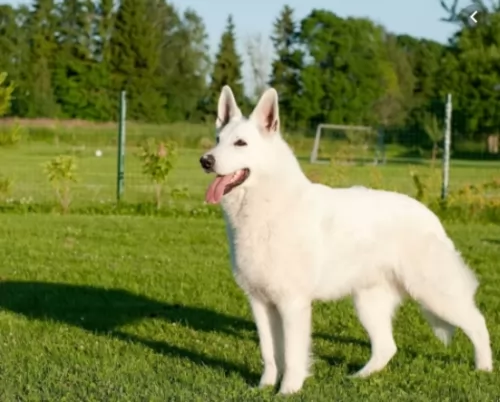 The German Shepherd and the white German Shepherd are the same dog - the only thing is that their coat colors vary.
The German Shepherd and the white German Shepherd are the same dog - the only thing is that their coat colors vary.
The White Shepherd evolved because people were looking for a working companion dog with a high degree of intelligence and a white coat.
The development of the White Shepherd began at the time of the 19th and 20th centuries. A breeding program was started but in 1933, the white coat color was made a disqualification in the German Shepherd Dog breed standard.
Not to be deterred, it was in 1969 that the U.S. and Canada formed White German Shepherd breed clubs and the breed was actually recognized by the UKC in 1999.
 This is a small breed with Loads of Spunk. The Silky terrier is somewhat longer than tall and height is around 23cm, with weight being about 4kg. He has an athletic build and although the bone structure is refined, the small dog has amazing strength and durability with a keen, alert face. Small but sturdily built, the dark, almond-shaped eyes don’t miss a thing as do the small, erect v-shaped ears.
This is a small breed with Loads of Spunk. The Silky terrier is somewhat longer than tall and height is around 23cm, with weight being about 4kg. He has an athletic build and although the bone structure is refined, the small dog has amazing strength and durability with a keen, alert face. Small but sturdily built, the dark, almond-shaped eyes don’t miss a thing as do the small, erect v-shaped ears.
Full of fun and packed with character, the Silky Terrier isn’t your regular lap dog as he is bold, active, feisty and playful- always ready for action. He can be aggressive toward strange pets but becomes amicable with other pets in the home. He is sharp and clever, and can be trained to be an absolute pleasure in the home and a playmate for children trained to be kind to animals.
They are loving and devoted to their human family and can be excellent watchdogs even though they can’t offer much protection.
Of course, the Silky Terrier gets his name from the sleek, silky coat that if allowed to grow, flows down from their backs to the floor. It is the dogs most distinctive feature. They come in several solid colors and mixes of colors too such as blue/tan, grey/blue and cream.
The Silky is an adaptable dog and even though he is energetic and will needs daily physical and mental exercise, he can be a country or an apartment dog, but will require plenty of exercise and getting out and about.
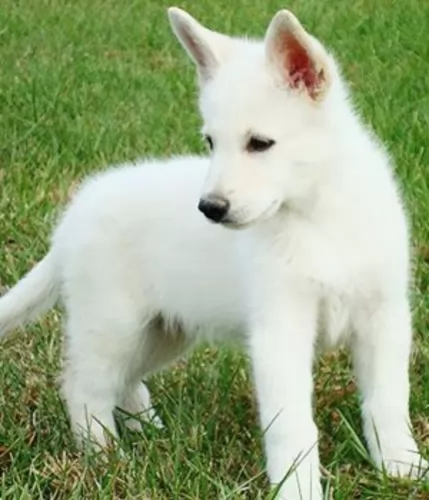 The White Shepherd is a true beauty and is a medium to large-sized dog that is muscular and strong. He stands at between 55 and 65cm in height and weighs between 35 and 40kg.
The White Shepherd is a true beauty and is a medium to large-sized dog that is muscular and strong. He stands at between 55 and 65cm in height and weighs between 35 and 40kg.
He is somewhat longer than tall. The double coat is medium length, dense, straight and white. He is a fairly heavy shedder. He has an intelligent face, a long muzzle and erect ears. The long tail is low-set.
This beautiful dog’s face tells you that he is highly intelligent. He can be easily trained. The bright eyes are eager and alert and he is ready to be an excellent guard dog and take his role as protector and guardian seriously.
The White Shepherd loves his human family and isn't overly enthusiastic around strangers. They’re playful dogs and will make great playmates for children. They also aren’t aggressive with other dogs and will get on well with other pets in the house.
 Small in stature but with a strong personality, the Australian Silky Terrier is a keen, intelligent, active, energetic and spunky breed. He is affectionate and loyal towards his human family, and although good with older children and other pets, he may not get on too well with small children and their erratic movements.
Small in stature but with a strong personality, the Australian Silky Terrier is a keen, intelligent, active, energetic and spunky breed. He is affectionate and loyal towards his human family, and although good with older children and other pets, he may not get on too well with small children and their erratic movements.
Don’t leave him alone for too long as he becomes anxious and destructive. He is an active dog too and while he will adapt to apartment living, he will need exercise and games to keep him active, fit, stimulated and healthy. Your Silky is an intelligent dog but he is stubborn too and proper socialization and training will be important for Silky Terriers, as then he becomes quite sociable.
A firm but gentle hand will be needed to train this wilful little dog, but when you show him who’s boss, he becomes your devoted and loyal friend.
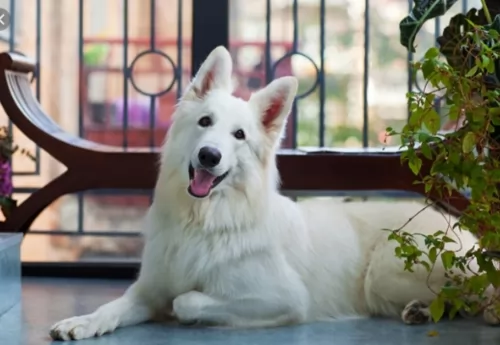 The White Shepherd is such a beautiful dog and he has some great characteristics to match his good looks.
The White Shepherd is such a beautiful dog and he has some great characteristics to match his good looks.
He is friendly and amicable with his human family and is a great protector as well. He isn’t aggressive yet he makes a great watchdog.
He is loving and loyal and forms strong bonds with his human family. Bringing him into your home and heart is guaranteed to confirm the opinion held that dogs are man's best friend.
 The Australian Silky Terrier is generally healthy and he has a lifespan of 11 – 14 years. However he may suffer from some problems such as Legg-Perthes disease. This means degeneration of the head on the femur bone of the dog's hind leg, resulting is osteoarthritis. This ailment is commonly seen in miniature-, small and toy breeds and can result in lameness and pain.
The Australian Silky Terrier is generally healthy and he has a lifespan of 11 – 14 years. However he may suffer from some problems such as Legg-Perthes disease. This means degeneration of the head on the femur bone of the dog's hind leg, resulting is osteoarthritis. This ailment is commonly seen in miniature-, small and toy breeds and can result in lameness and pain.
Silky Terriers are also prone to certain eye disorders, including PRA or Progressive Retinal Atrophy as well as cataracts. PRA can lead to total blindness.
Getting the right puppy shots and vaccinations is also part of good health care for your Silky and you can speak to your vet about what injections are due at 6 – 8 weeks of age and what booster vaccinations may be necessary.
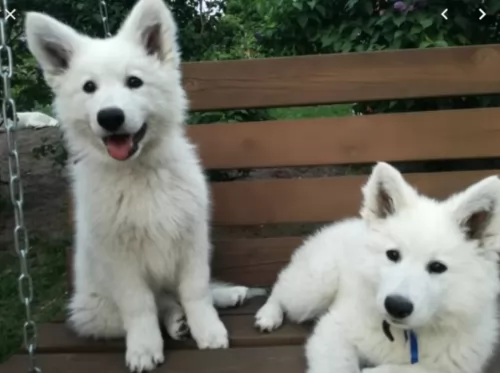 The White Shepherd shares health problems much the same as the German Shepherd, and one of these is hip dysplasia.
The White Shepherd shares health problems much the same as the German Shepherd, and one of these is hip dysplasia.
These dogs are at risk of getting hip dysplasia. It’s a congenital disorder with dogs inheriting the disease from their parents. Some young dogs can get the disease too. Because they are such active dogs, the White Shepherd is at risk of dysplasia. There are a number of signs you can look for in your dog and some of these are -
Your vet may want x-rays to examine your dog's hips. Your vet will want to slow the development of the disease and also ease the pain in your pet. There are other steps the vet will suggest to you that can make it as comfortable as possible for your pet.
 The long, straight coat of the Silky will need a fair amount of brushing each day. This dog is considered a hypoallergenic breed, and although he doesn’t shed a lot, the length of the hair will require regular brushing to get rid of loose hairs but also ensure there is no tangling of the hair. If the hair of the dog is kept long, he may require a bath every now and then to keep his hair silky and clean and to get rid of dirt build-up.
The long, straight coat of the Silky will need a fair amount of brushing each day. This dog is considered a hypoallergenic breed, and although he doesn’t shed a lot, the length of the hair will require regular brushing to get rid of loose hairs but also ensure there is no tangling of the hair. If the hair of the dog is kept long, he may require a bath every now and then to keep his hair silky and clean and to get rid of dirt build-up.
A healthy, nutritional diet is important for keeping your canine friend healthy and free from disease and unhealthy skin. To stay health your pet will require correct amounts of vitamins and minerals.
Dog food companies make different types of dog food such as dry, semi-moist, and moist and these are available for dogs of different ages, activity levels and stage of life. Speak to your vet about selecting a dog food that is right for your Australian Silky Terrier and always ensure a bowl of fresh water is available to him.
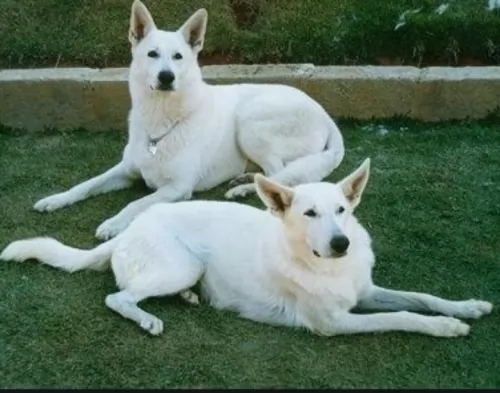 The White Shepherd's weather-resistant double coat will need to be brushed regularly as he is quite a heavy shedder. When brushing him, check for ticks and fleas as well as any unusual lumps.
The White Shepherd's weather-resistant double coat will need to be brushed regularly as he is quite a heavy shedder. When brushing him, check for ticks and fleas as well as any unusual lumps.
This beautiful dog was developed from a herding breed so he is very active. He will love a walk every day but that won’t be sufficient. He just loves ball games, and if you take him to the park, he’ll love you throwing sticks for him or the frisbee.
Because of his intelligence, he will require mental and physical stimulation. You get some toys for dogs where you can put some kibble in the toy and he has to figure out a way to get the food out.
The White Shepherd is an active dog, so to keep him that way, ensure he gets good food which has the right balance of vitamins.
There are good commercially manufactured dog foods on the market, but the idea is to know how to choose the high-quality ones and to avoid the ones that can actually jeopardize your dog’s health.
Always read the write-up on the packaging and choose according to your pet’s age and his activity levels.
It is always a good idea to give such a dog some home-made food too. Not any kind of home-made food either because you have to be careful with dogs to avoid them suffering from abdominal pain. They like their food plain and simple – boiled chicken, brown rice and vegetables.
Some raw meat occasionally is also good. Don’t forget to ensure a constant supply of cool, fresh water.